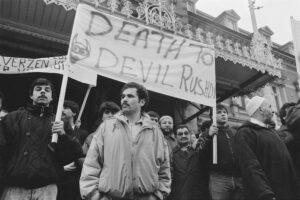Building intolerance in Switzerland
By Khaled Diab
The Swiss minaret ban doesn't mean European Muslims are persecuted, but it makes me worry for the Europe my son has been born into.
7 December 2009
Though Muslims don't need minarets to worship, the Swiss vote to ban them is a troubling sign of mounting intolerance.
Alongside the crescent, the minaret is one of the most instantly recognisable symbols of Islam. However, it's only functional purpose – to call worshippers to pray – has, in the modern age, become obsolete. And even then, it is not absolutely necessary, as attested to by the earliest mosques which did not have minarets.
That is why, at face value, the Swiss referendum on whether to ban minarets, especially since there are only four of them in the entire country, as Tariq Ramadan points out, seems superficial and pointless. In fact, when my wife first heard the news she wondered whether the Swiss didn't have anything more important to go to the ballot box for.
Preposterous as the whole campaign is, especially given that Zurich's oldest minaret is so much a part of the cityscape that most passers-by don't even notice it, it does carry certain ominous undertones.
Although mosques don't need minarets to function and Muslims don't need them to worship, the Swiss decision – by a majority of 57% – to ban their construction carries enormous symbolic significance. Ironically, it even came on the weekend in which Muslims were celebrating one of their holiest festivals, Eid al-Adha.
To be clear, Muslims in Switzerland are still legally entitled to practise their faith. However, the message this vote sends is one that undermines the principle of religious freedom. The Swiss are effectively saying that, even if Muslims have the legal right to gather together for communal prayer, mainstream society wants them to be invisible.
In addition, one can't help thinking that for one of the main sponsors of the referendum, the far-right and populist Swiss People's Party (SVP), the heart of the issue is not so much minarets, but Muslims themselves. If it were up to them, I suspect, they would much rather ban Islam than minarets – but fortunately the law would never allow them to organise such a vote and Swiss voters don't fear Muslims enough to go that far – judging by some of the statements members of the party made in the run-up to the vote.
For example, the SVP's Ulrich Schlüer described the minaret as “a symbol of political power, a prelude to the introduction of sharia law”. In this, the SVP is like far-right parties across Europe who subscribe to the preposterous notion of the imminent emergence of a “Eurabia”, a myth I've deconstructed before.
As a sign of the deeper hatred upon which this ban is built – and a foretaste of things to come if we do not address the issue of intercommunal relations in Europe urgently – anti-Muslim politicians in other parts of Europe are already jumping on the Swiss bandwagon.
The party of the infamous Geert Wilders – who has already called unsuccessfully for the banning of the Qur'an – has demanded a similar referendum to be carried out in the Netherlands.
Mario Borghezio of Italy's Northern League also called for a vote in Italy, surreally suggesting that: “The flag of a courageous Switzerland which wants to remain Christian is flying over a near-Islamised Europe.”
Unsurprisingly, the Swiss decision has not gone down well in Arab and Muslim countries. But I offer a similar observation to the one I made at the time of the German hijab murder controversy: troubling and Islamophobic as this vote is, millions of Swiss and other Europeans also find it reprehensible. In addition, it is not a sign that European Muslims are being persecuted. In fact, the Muslim minority in most of Europe enjoys more freedom of faith and conscience than minorities in many Muslim countries.
Nevertheless, the vote does fill me with foreboding. If matters are left unchecked, then European Muslims could well one day, become an oppressed or persecuted minority, and the artificial divide between western and Muslim countries could widen until it becomes an unbridgeable chasm.
We like to take pride in the fact that we live in the most tolerant times ever. But there were periods in Europe's history where Christianity and Islam actually may have co-existed more harmoniously than they do today. An interesting example of this was Sicily, under both Arab and Norman rule.
On the eve of the Swiss minaret referendum, our son, who is of mixed Arab and European background, was born. Although we are sceptical of religion, intend to give him a secular upbringing and let the choice of belief system be his when he comes of age, I hope that by the time Iskander is an adult, he will be able to live comfortably and proudly with his multicultural heritage and not be discriminated against because of it.
This column appeared in The Guardian Unlimited's Comment is Free section on 1 December 2009. Read the related discussion.



I agree Johan, referenda rarely result in a refined consensus of a people’s wishes. The alternative? Public debate is all good and well but it’s easy to ignore. Moderates (Declan) only dare to speak up when their comfy life or status quo is endangered. What would it take to stir that up?
(-:
When the church bells chime, I cannot see a muslim complain about it. This whole referendum is not about minarets, they are completely harmless. But it is about forging a public sentiment that tolerance should have its limits. And that is dangerous. In that case, you need a open discussion in Switzerland with Muslims and the Swiss about freedom of religion. Now, I see no debate from two sides, but just a yes/no vote.
Well expressed! Let’s hope tolerance wins out in the end.